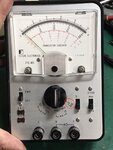diydidi
Junior Member level 1
I recently acquired a Future Electronics FTC-401 transistor checker.
It was made in Japan.
i cant find a manual for it anywhere. There is a new company listed with the name “future Electronics “ but they know nothing of it.
I have attached a photo. Anyone know anything about these units or perhaps have a manual?
thank you.
It was made in Japan.
i cant find a manual for it anywhere. There is a new company listed with the name “future Electronics “ but they know nothing of it.
I have attached a photo. Anyone know anything about these units or perhaps have a manual?
thank you.
